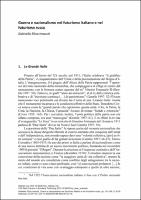Chapter Guerra e nazionalismo nel futurismo italiano e nel futurismo russo
| dc.contributor.author | Imposti, Gabriella Elina | |
| dc.date.accessioned | 2022-09-15T20:06:14Z | |
| dc.date.available | 2022-09-15T20:06:14Z | |
| dc.date.issued | 2019 | |
| dc.identifier | ONIX_20220915_9788864539102_42 | |
| dc.identifier.issn | 2612-7679 | |
| dc.identifier.uri | https://library.oapen.org/handle/20.500.12657/58246 | |
| dc.language | Italian | |
| dc.relation.ispartofseries | Biblioteca di Studi Slavistici | |
| dc.subject.classification | thema EDItEUR::J Society and Social Sciences::JH Sociology and anthropology::JHB Sociology | en_US |
| dc.subject.other | Russia | |
| dc.subject.other | Italy | |
| dc.subject.other | Nationalism | |
| dc.subject.other | Panslavism | |
| dc.subject.other | Futurism | |
| dc.title | Chapter Guerra e nazionalismo nel futurismo italiano e nel futurismo russo | |
| dc.type | chapter | |
| oapen.abstract.otherlanguage | This article argues that the traditional picture of Russian Futurists as fiercely opposed to this war does not correspond to reality. We begin by examining the general historical background for Marinetti’s notorious motto “War as the World’s only Hygiene” and identify echoes of this conception in articles that Vladimir Majakovskij published in the autumn of 1914. Nationalistic and panslavic ideas, coupled with anti-German sentiments, characterized the early years of Velimir Chlebnikov’s literary activity; we explore these ideas and Chlebnikov’s gradual passage from this belligerent vision to his utopian project for a world without wars. | |
| oapen.identifier.doi | 10.36253/978-88-6453-910-2.18 | |
| oapen.relation.isPublishedBy | bf65d21a-78e5-4ba2-983a-dbfa90962870 | |
| oapen.relation.isbn | 9788864539102 | |
| oapen.series.number | 43 | |
| oapen.pages | 12 | |
| oapen.place.publication | Florence |

